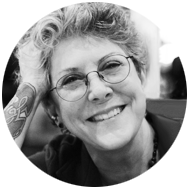 Brenda Laurel has worked in interactive media since 1976—in the computer game industry from Atari to Activision, and in research labs at Atari, Interval Research, and as a Distinguished Engineer at Sun Labs. At the Banff Centre, she co-designed and produced the ground-breaking VR piece, Placeholder. She researched gender and technology at Interval and she co-founded Purple Moon—interactive media for girls—in 1996. She designed and chaired the Graduate Media Design Program at Art Center College of Design (2001-2006) and the Graduate Design Program at California College of the Arts (2006-2012). She also served as an adjunct Professor in the Games and Palayble Media Program at UC Santa Cruz (2013-2015). In 2015 she received the Trailblazer Award from Indiecade. She was awarded the Nextant Prize from the Virtual World Society in 2016. She serves on the boards of the Interaction Design Association, the Virtual World Society, and the Communication Research Institute (Australia). Her books include The Art of Human-Computer Interface Design (1990), Utopian Entrepreneur (2001), Design Research: Methods and Perspectives (2004), and Computers as Theatre, Second Edition (2014). Her recent papers include “What Is Virtual Reality?” (Medium) and “AR and VR: Cultivating the Garden” (MIT Press Journal Presence). She earned her MFA in acting and directing and her PhD in drama theory and criticism from The Ohio State University. Her thesis was the first to propose and examine the dramatic structure of what would come to be known as virtual reality. She currently works as an independent scholar and consultant.
Brenda Laurel has worked in interactive media since 1976—in the computer game industry from Atari to Activision, and in research labs at Atari, Interval Research, and as a Distinguished Engineer at Sun Labs. At the Banff Centre, she co-designed and produced the ground-breaking VR piece, Placeholder. She researched gender and technology at Interval and she co-founded Purple Moon—interactive media for girls—in 1996. She designed and chaired the Graduate Media Design Program at Art Center College of Design (2001-2006) and the Graduate Design Program at California College of the Arts (2006-2012). She also served as an adjunct Professor in the Games and Palayble Media Program at UC Santa Cruz (2013-2015). In 2015 she received the Trailblazer Award from Indiecade. She was awarded the Nextant Prize from the Virtual World Society in 2016. She serves on the boards of the Interaction Design Association, the Virtual World Society, and the Communication Research Institute (Australia). Her books include The Art of Human-Computer Interface Design (1990), Utopian Entrepreneur (2001), Design Research: Methods and Perspectives (2004), and Computers as Theatre, Second Edition (2014). Her recent papers include “What Is Virtual Reality?” (Medium) and “AR and VR: Cultivating the Garden” (MIT Press Journal Presence). She earned her MFA in acting and directing and her PhD in drama theory and criticism from The Ohio State University. Her thesis was the first to propose and examine the dramatic structure of what would come to be known as virtual reality. She currently works as an independent scholar and consultant.
Category: Bio
Frank Lantz — NYU
 Frank Lantz is the Director of the NYU Game Center. He has taught game design for over 15 years at NYU, SVA, and Parsons and his writings on games, technology and culture have appeared in a variety of publications.
Frank Lantz is the Director of the NYU Game Center. He has taught game design for over 15 years at NYU, SVA, and Parsons and his writings on games, technology and culture have appeared in a variety of publications.
Frank is a game designer who has worked in the field of game development for the past 20 years. In 2005 he co-founded Area/Code, which created cross-media, location-based, and social network games as well as the popular abstract puzzle game Drop7. Before starting Area/Code, Frank worked on a wide variety of games as the Director of Game Design at Gamelab, Lead Game Designer at Pop & Co, and Creative Director at R/GA Interactive.
Frank helped pioneer the genre of large-scale realworld games, working on projects such as the Big Urban Game, which turned the cities of Minneapolis and Saint Paul into the world’s largest boardgame; Sharkrunners, which allowed players to interact with living sharks in a persistent virtual world, PacManhattan, a life-size version of the arcade classic created by the students in his Big Games class at NYU, and many other experiments in pervasive and urban gaming.
Eric Klopfer — MIT
 Eric Klopfer is Professor and Director of The Education Arcade and Scheller Teacher Education Program at MIT. Klopfer’s research focuses on the development and use of computer games and simulations for building understanding of science, technology, engineering and mathematics. The games that he works on are designed to build understanding of scientific practices and concepts as well as critical knowledge, using both mobile and web-delivered game platforms. In the realm of simulations, Klopfer’s work focuses on students understanding complex systems through, and connecting computer programming with scientific practice, critical thinking, and real-world issues.
Eric Klopfer is Professor and Director of The Education Arcade and Scheller Teacher Education Program at MIT. Klopfer’s research focuses on the development and use of computer games and simulations for building understanding of science, technology, engineering and mathematics. The games that he works on are designed to build understanding of scientific practices and concepts as well as critical knowledge, using both mobile and web-delivered game platforms. In the realm of simulations, Klopfer’s work focuses on students understanding complex systems through, and connecting computer programming with scientific practice, critical thinking, and real-world issues.
 Jesper Juul is an influential video game theorist and occasional video game developer. He has been working with video game research since the late 1990’s. He is an Associate Professor at the Royal Danish Academy of Fine Arts – School of Design and a Visiting Associate Professor at MIT.
Jesper Juul is an influential video game theorist and occasional video game developer. He has been working with video game research since the late 1990’s. He is an Associate Professor at the Royal Danish Academy of Fine Arts – School of Design and a Visiting Associate Professor at MIT.
He has published three books with MIT Press: Half-Real (2005), A Casual Revolution (2009) and The Art of Failure (2013). He is also a co-editor of the Playful Thinking Series (also on MIT Press).
He maintains the blog The Ludologist on video games and other important things. www.jesperjuul.net/ludologist
 Henry Jenkins is the Provost’s Professor of Communication, Journalism, Cinematic Arts and Education at the University of Southern California and the founder and former director of the Comparative Media Studies graduate Program at MIT. He is the author and editor of more than 17 books, including From Barbie to Mortal Kombat: Gender and Computer Games, Textual Poachers: Television Fans and Participatory Culture, Fans, Bloggers, and Gamers, Convergence Culture: Where Old and New Media Collide, Spreadable Media: Creating Meaning and Value in a Networked Culture, and By Any Media Necessary: The New Youth Activism. He was a founder of the Education Arcade and the GAMBIT Singapore-MIT Games Lab. He blogs twice a week at henryjenkins.org.
Henry Jenkins is the Provost’s Professor of Communication, Journalism, Cinematic Arts and Education at the University of Southern California and the founder and former director of the Comparative Media Studies graduate Program at MIT. He is the author and editor of more than 17 books, including From Barbie to Mortal Kombat: Gender and Computer Games, Textual Poachers: Television Fans and Participatory Culture, Fans, Bloggers, and Gamers, Convergence Culture: Where Old and New Media Collide, Spreadable Media: Creating Meaning and Value in a Networked Culture, and By Any Media Necessary: The New Youth Activism. He was a founder of the Education Arcade and the GAMBIT Singapore-MIT Games Lab. He blogs twice a week at henryjenkins.org.
 Robin Hunicke is the Co-Founder & CEO of the independent game studio Funomena, which creates experimental games for Console, PC, VR & AR platforms in the heart of downtown San Francisco. A game designer and producer by training, she has a background in Computer Science, Art and applied Game Studies. She has been designing, making and teaching about games for over 12 years (Journey, Boom Blox, MySims, TheSims2).
Robin Hunicke is the Co-Founder & CEO of the independent game studio Funomena, which creates experimental games for Console, PC, VR & AR platforms in the heart of downtown San Francisco. A game designer and producer by training, she has a background in Computer Science, Art and applied Game Studies. She has been designing, making and teaching about games for over 12 years (Journey, Boom Blox, MySims, TheSims2).
Robin is an outspoken evangelist for diversity, and has dedicated the second half of her career to broadening the participation of women and under-represented minorities within the Arts, Entertainment & Technology communities. To that end, she joined UCSC’s Arts Division as Associate Professor as Director of the Art, Games & Playable Media BA in 2014. In 2015 she joined the Digital Arts and New Media MFA program faculty, and founded the Ludo Lab Center for Games, Play & SocialPractice. Along with her colleagues throughout the UC system, Robin works to provide students with opportunities to explore how they can impact society via creative, technological, social & entrepreneurial practices.
In addition to her commercial and educational work, Robin curates the annual Experimental Gameplay Workshop, sits on the PlaySFMOMA, FDG & VRDC advisory boards, and volunteers in support of initiatives such as: the Lexus Design Award, Girls Make Games, Anita Borg Foundation, Google Made with Code, as well as the Higher Education Video Game Alliance and the CS For All initiative.
Ian Horswill — Northwestern University
 Ian Horswill is an Associate Professor of Computer Science at Northwestern University, where he was the co-founder of Northwestern’s Animate Arts Program. His research interests include interactive entertainment technologies and cognitive modeling for virtual characters, particularly modeling of emotion and personality. He received his PhD in Computer Science from the Massachusetts Institute of Technology in 1993.
Ian Horswill is an Associate Professor of Computer Science at Northwestern University, where he was the co-founder of Northwestern’s Animate Arts Program. His research interests include interactive entertainment technologies and cognitive modeling for virtual characters, particularly modeling of emotion and personality. He received his PhD in Computer Science from the Massachusetts Institute of Technology in 1993.
Carrie Heeter — Michigan State University
 “I design and study cybermeditation and teach foundations of serious games and human-centered experience design courses.
“I design and study cybermeditation and teach foundations of serious games and human-centered experience design courses.
I have studied meditation intensively for seven years with my teacher, Dr. Marcel Allbritton, in the tradition of Sri T. Krishnamacharya and T.K.V. Desikachar. I am a certified Yoga Meditation Teacher. For the last six years I have participated in bi-monthly meditation planning classes taught by Chase Bossart.
Together Marcel and I have been developing approaches to design and deliver meditation in this system of yoga and meditation. I am Founding Director of Mindtoon Lab LLC (now also known as Yoga Mind Tools), a startup that designs Mindtoon™ cybermeditation experiences including virtual reality meditation experiences and outcome-based meditation apps for productivity, lifestyle, and well-being. We also explore the idea of meditation as meaningful play.
I direct MSU’s fully online graduate certificate in serious games. Throughout my 40+ year career, I have designed and studied technology-enhanced experiences. I have designed and directed development of more than 50 interactive experiences including learning and cognitive games and other technology-enhanced learning experiences, interactive learning systems, and patient empowerment software. I have published more than 100 books, chapters, articles, and proceedings about individual and social impacts of interactive technology, gender and gaming, and playstyles and player types.
My academic degrees include a Ph.D. in Mass Media (1986) and a BA in Communication (1982), both from Michigan State University. I was founding director of the Communication Technology Laboratory (1980 to 2005) which has transformed into the thriving GEL Lab (Games for Entertainment and Learning) lead by Brian Winn.”
James Paul Gee — Arizona State University
 James Paul Gee is a member of the National Academy of Education. His book Sociolinguistics and Literacies (1990, Fifth Edition 2015) was one of the founding documents in the formation of the “New Literacy Studies”, an interdisciplinary field devoted to studying language, learning, and literacy in an integrated way in the full range of their cognitive, social, and cultural contexts. His book An Introduction to Discourse Analysis (1999, Fourth Edition 2014) brings together his work on a methodology for studying communication in its cultural settings, an approach that has been widely influential over the last two decades. Professor Gee’s most recent books deal with video games, language, and learning. What Video Games Have to Teach Us About Learning and Literacy (2003, Second Edition 2007) argues that good video games are designed to enhance learning through effective learning principles supported by research in the Learning Sciences. Situated Language and Learning (2004) places video games within an overall theory of learning and literacy and shows how they can help us in thinking about the reform of schools. Women as Gamers: The Sims and 21st-Century Learning (2010) and Language and Learning in the Digital Age (2011), both written with Elisabeth Hayes, have continued his earlier work on games and learning. His most recent books are: The Anti-Education Era: Creating Smarter Students through Digital Learning (2013); Unified Discourse Analysis: Language, Reality, Virtual Worlds, and Video Games (2014); Literacy and Education (2014); The Essential James Gee: An Introduction to Discourse Analysis (2015); and Teaching, Learning, Literacy in Our High-Risk High-Tech World: A Framework for Becoming Human (2017). Professor Gee has published widely in journals in linguistics, psychology, the social sciences, and education.
James Paul Gee is a member of the National Academy of Education. His book Sociolinguistics and Literacies (1990, Fifth Edition 2015) was one of the founding documents in the formation of the “New Literacy Studies”, an interdisciplinary field devoted to studying language, learning, and literacy in an integrated way in the full range of their cognitive, social, and cultural contexts. His book An Introduction to Discourse Analysis (1999, Fourth Edition 2014) brings together his work on a methodology for studying communication in its cultural settings, an approach that has been widely influential over the last two decades. Professor Gee’s most recent books deal with video games, language, and learning. What Video Games Have to Teach Us About Learning and Literacy (2003, Second Edition 2007) argues that good video games are designed to enhance learning through effective learning principles supported by research in the Learning Sciences. Situated Language and Learning (2004) places video games within an overall theory of learning and literacy and shows how they can help us in thinking about the reform of schools. Women as Gamers: The Sims and 21st-Century Learning (2010) and Language and Learning in the Digital Age (2011), both written with Elisabeth Hayes, have continued his earlier work on games and learning. His most recent books are: The Anti-Education Era: Creating Smarter Students through Digital Learning (2013); Unified Discourse Analysis: Language, Reality, Virtual Worlds, and Video Games (2014); Literacy and Education (2014); The Essential James Gee: An Introduction to Discourse Analysis (2015); and Teaching, Learning, Literacy in Our High-Risk High-Tech World: A Framework for Becoming Human (2017). Professor Gee has published widely in journals in linguistics, psychology, the social sciences, and education.
Mary Flanagan — Dartmouth College
 Mary Flanagan is a leading innovator, artist, educator and designer, whose works have included everything from game-inspired art, to commercial games that shift people’s thinking about biases and stereotypes. Known for her theories on playculture, responsible design, and critical play, Flanagan has achieved international acclaim for her novel interdisciplinary work that includes a studio art practice and entrepreneurship alongside humanities scholarship and scientific inquiry. In 2015 Flanagan was awarded the Higher Education Video Games Alliance award for “advancing theory & research” in the field of game studies. In 2016 she was awarded the Vanguard award from Games for Change. Flanagan holds an honorary doctorate in design from the Illinois Institute of Technology and is the Sherman Fairchild Distinguished Professor in Digital Humanities at Dartmouth College.
Mary Flanagan is a leading innovator, artist, educator and designer, whose works have included everything from game-inspired art, to commercial games that shift people’s thinking about biases and stereotypes. Known for her theories on playculture, responsible design, and critical play, Flanagan has achieved international acclaim for her novel interdisciplinary work that includes a studio art practice and entrepreneurship alongside humanities scholarship and scientific inquiry. In 2015 Flanagan was awarded the Higher Education Video Games Alliance award for “advancing theory & research” in the field of game studies. In 2016 she was awarded the Vanguard award from Games for Change. Flanagan holds an honorary doctorate in design from the Illinois Institute of Technology and is the Sherman Fairchild Distinguished Professor in Digital Humanities at Dartmouth College.
